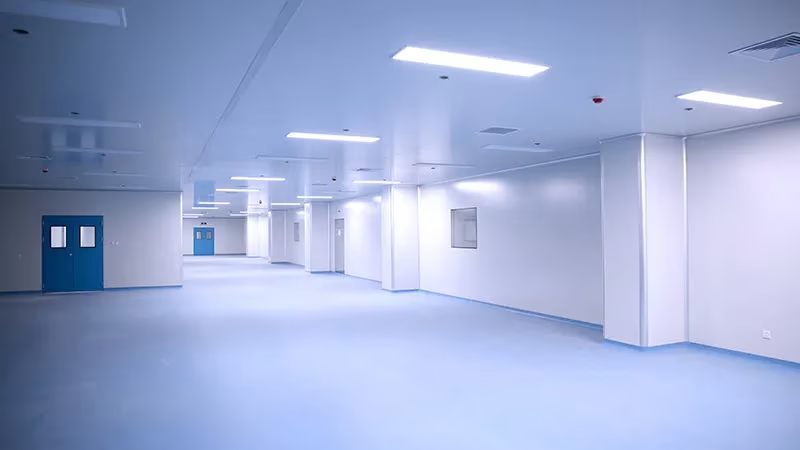CLEAN ROOMS
Insulated Panel Clean Rooms

For Precision Industries
Clean rooms serve as specialized environments tailored for industries demanding stringent cleanliness and environmental control. These controlled spaces find critical applications in sectors like pharmaceuticals, electronics manufacturing, biotechnology, and aerospace. They are meticulously constructed using insulated panels to offer both thermal insulation and meticulous oversight over temperature, humidity, and cleanliness. Here are the key features and facets of clean rooms built with insulated panels:
Innovative Insulated Panels: The clean room’s structure, encompassing walls, ceiling, and at times, the floor, is fashioned with insulated panels. These panels typically comprise an insulating core material, such as polyurethane foam or polyisocyanurate foam, sandwiched between two layers of rigid facing materials, often metal, including stainless steel or aluminum. This configuration provides effective thermal insulation along with a seamless, easy-to-clean surface.
Precise Temperature and Humidity Management: Equipped with state-of-the-art HVAC systems, insulated panel clean rooms are engineered to meticulously regulate temperature and humidity levels within the environment. This level of control proves pivotal for specific manufacturing processes and the secure storage of delicate materials.
Stringent Cleanliness Standards: Clean rooms are categorized into various cleanliness levels, typically denoted by ISO Class ratings, ranging from ISO Class 1 (the highest standard) to ISO Class 9 (the least stringent). Employing high-efficiency particulate air (HEPA) or ultra-low penetration air (ULPA) filters, airborne particles are effectively removed. Furthermore, the room is maintained at positive pressure to prevent the ingress of contaminants.
Precise Airflow Management: The airflow patterns within the clean room are meticulously devised to ensure efficient elimination of contaminants. This frequently involves the implementation of laminar flow systems, where filtered air flows uniformly to minimize particle accumulation.
Adequate Illumination: Clean rooms are equipped with ample lighting to facilitate tasks, all while ensuring that the fixtures themselves do not contribute to contamination.
Specialized Flooring: The flooring within clean rooms is typically fashioned from materials that are easy to clean and maintain, such as epoxy or vinyl. Additionally, flooring may incorporate static-control properties to safeguard sensitive electronic equipment.
Insulated panel clean rooms play a pivotal role in industries where precision, contamination control, and product integrity are paramount. They furnish a regulated environment safeguarding sensitive processes, equipment, and materials from contamination, all while ensuring essential thermal insulation. The design and operation of these clean rooms adhere rigorously to industry-specific standards and regulations, guaranteeing product quality and safety.
FAQs
A clean room is a specialized, controlled environment designed to maintain exceptionally high levels of cleanliness and environmental control.
Importance in Industries: Clean rooms are crucial in industries such as pharmaceuticals, electronics manufacturing, biotechnology, and aerospace, where contamination control is paramount for product quality and safety.
- Classification: Clean rooms are classified based on the quantity and size of airborne particles permitted per cubic meter. Classifications range from ISO Class 1 (the cleanest) to ISO Class 9 (the least clean).
- Cleanliness Levels: The choice of cleanliness level depends on the specific requirements of the industry and the sensitivity of the processes or products being handled.
- Insulated Panels: Clean rooms often use insulated panels for walls, ceilings, and floors to provide thermal insulation and a smooth, cleanable surface.
- Temperature and Humidity Control: HVAC systems are employed to precisely control temperature and humidity.
- Airflow Control: Clean rooms have carefully designed airflow patterns to remove contaminants efficiently.
- Cleanroom Attire: Personnel must wear specialized cleanroom attire, including suits, gloves, and footwear, to minimize the introduction of contaminants.
- Clean rooms ensure that manufacturing processes occur in a controlled environment with minimal contamination, preserving product quality.
- They help meet regulatory requirements in industries like pharmaceuticals and biotechnology, ensuring product safety.
Yes, Clean Rooms are highly customizable to meet the unique requirements of different industries. They can be designed and equipped to handle specific processes, cleanliness levels, and environmental conditions required by the industry they serve.
Clean rooms play a vital role in maintaining product integrity, research precision, and contamination control in various industries, making them a cornerstone of quality and safety.
Our Product
Brochure
Download our product and service brochures to see specific data and how we work.
Let’s Start Work Together
Please feel free to contact us. We will get back to you with 1-2 business days. Or just call us now.